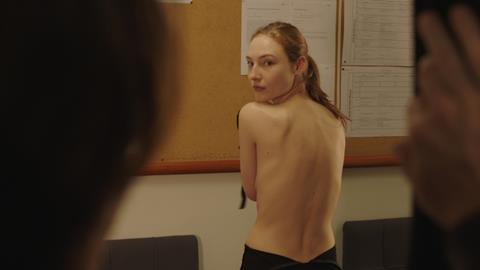Dir: Benoît Jacquot. 2016, France/Portugal, 86 mins

That dependable French staple amour fou meets the tradition of the haunted house narrative – with a side serving of performance art – in Never Ever, an adaptation of the Don De Lillo novella The Body Artist from veteran French director Benoît Jacquot.
Julia Roy’s sometimes ethereal presence strikes a forceful but delicate note as a woman who is at once facing a mystery and who is at the same time a mystery herself.
An elusive, prolific film-maker whose auteur stamp isn’t always easy to detect in a wide range of films, Jacquot nevertheless always has an intelligent, even contemplative approach to his material, and tends to focus on complex female protagonists – both of which are certainly true of Never Ever. A dependably nervy performance from Mathieu Amalric, plus the De Lillo connection, will be its most immediate selling points, but Never Ever also represents a striking breakthrough by novice co-star, and the film’s writer, Julia Roy.
An enigmatic, somewhat poetic tone could limit commercial prospects of this seductively moody but comparatively slender piece, though Never Ever will certainly haunt the festival circuit.
Shot in Portugal, the film begins with French film-maker Rey (Amalric) presenting his work at an arts centre, where he finds himself fascinated by the strange sinuous movements of a young woman, Laura (Roy), rehearsing her work. He promptly whisks her off to the dark, secluded modernist house he’s been renting, giving the slip to his lead actress Isabelle, with whom he has unfinished romantic business (although from his point of view, it’s very much finished). The fact that Isabelle is played – with relishable crispness – by Jeanne Balibar, Amalric’s former spouse and frequent co-star in the past, gives their playing a discomforting but mischievous piquancy.
Rey and performance artist Laura settle into his house, both seemingly neglecting their work, and things go swimmingly – except for the odd creaks, bangs and other sounds that haunt its cavernous spaces. Then tragedy strikes – in a highly dramatic way that’s never fully explained – and Laura starts to go to pieces. It would be a spoiler to describe exactly what happens to her, but she undergoes a strange form of grieving that calls on Laura’s, and Roy’s, performance skills in no uncertain fashion.
A world away from his recent grand-scale Jacquot costume pieces such as Diary of a Chambermaid and Farewell My Queen, Never Ever is more in the pensive chamber-drama mode of, say, Isabelle Huppert starrer Villa Amalia, though this film is more abstract, if anything, as befits the elliptical nature of De Lillo’s original text.
DoP Julien Hirsch atmospherically captures the eeriness of the couple’s home – in a sense the film’s fourth star – and some high-charged motorbike sequences are suitably intense. Amalric, these days persuasively settling into scuffed middle-aged roles, is effective as ever, but still maintains an anxious look; while Roy’s sometimes ethereal presence strikes a forceful but delicate note as a woman who is at once facing a mystery and who is at the same time a mystery herself.
Production companies: Alfama Films, Leonardo Filmes International sales: Alfama Films andrea.alfamafilms@orange.fr
Producer: Paolo Branco
Screenplay: Julia Roy
Adapted from The Body Artist by Don De Lillo
Cinematography: Julien Hirsch
Production designer: Paula Szabo
Editor: Julia Gregory
Music: Bruno Coulais
Main cast: Mathieu Amalric, Julia Roy, Jeanne Balibar, Victoria Guerra






![The Brightest SunScreen[Courtesy HKIFF]](https://d1nslcd7m2225b.cloudfront.net/Pictures/274x183/3/5/0/1448350_thebrightestsunscreencourtesyhkiff_312678.jpg)















![The Brightest SunScreen[Courtesy HKIFF]](https://d1nslcd7m2225b.cloudfront.net/Pictures/100x67/3/5/0/1448350_thebrightestsunscreencourtesyhkiff_312678.jpg)

